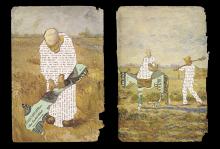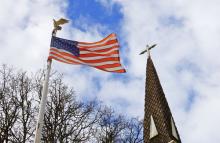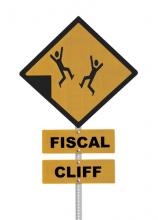Taxes

IN A JUST ECONOMY, everyone who wants a job has one, and it pays a living wage, sufficient for workers and their families to thrive. Everyone’s material needs — for nutritious food, safe and secure housing, transportation, clothing, utilities, education, health care, and economic security — are met. Economists call this full employment in living wage jobs, and it is a goal of many justice advocates. It is also God’s vision for society.
Jesus told the disciples that he came so all may have abundant life (John 10:10). As Jesus showed, God’s vision encompasses more than abundant spiritual life. Jesus understood that God’s vision of abundance encompasses material needs as well as spiritual ones. Jesus healed broken bodies. He fed hungry people and encouraged others to do so as well. In God’s reign, everyone’s material needs are filled. But how does God envision this to happen?
The Old and New Testaments reveal a great deal about God’s intentions for the economy, the word we use to describe the way in which we use God-given natural resources — soil, rain, sun, fuels, minerals, trees, etc. — in combination with human effort and ingenuity (also given by God) to produce all our goods and services. We can gain important insights relevant to our economy today by examining the economic circumstances of the Israelites during three different biblical eras and then exploring what the biblical writers and Jesus taught about the economy and economic injustices during those periods.
Over the more than 10 centuries during which the biblical narrative was composed, the economic circumstances of the Israelites changed markedly and, in response, so did the economic instructions in the Bible. But, surprisingly, in each of the three eras, the instructions called for livelihoods for all that enabled thriving or, in our language today, full employment in living wage jobs.
In the Old Testament — the Hebrew Bible — the economic instructions are part of the laws found in Exodus, Leviticus, and Deuteronomy. Today, Christians often insufficiently value this body of law. Some of it seems strange to our modern ears. Other provisions fall far short of current standards for justice — for example, slavery and patriarchy were normalized then. Certainly some of our laws today will fall short of more enlightened future standards. But as we will see below, the law contains much timeless wisdom. To the Israelites, the law was a gift from God, a blessing, a guide to more joyful and fulfilling lives lived in right relationship with God. Psalm 23, one of the most beloved and well-known biblical psalms, tells of the comfort derived from God-the-Shepherd’s rod and staff, tools used to guide sheep in safe, life-giving paths. If we are open to it, we can gain important insights from the ancient laws.

“It is absurd for Jerusalem residents to fund municipal services for the churches … on their own, and for the municipality to be prevented from collecting enormous sums that could significantly improve the city’s development and services,” Barkat said.

The majority of the American solar industry has opposed the tariffs, saying that it would be detrimental to the industry. The Solar Energy Industries Association (SEIA) predicted the loss of approximately 23,000 jobs within the sector due to the imposed tariffs in a press release.

The idea that government has an important role to play in human flourishing was made by Pope Leo XIII in his 1891 encyclical Rerum Novarum. In it, the pope argued that governments should promote “the common good.” Catholicism defines the “common good” as the “conditions which allow people, either as groups or as individuals, to reach their fulfillment more fully and more easily.”

The pro-Trump evangelicals suffer from a spiritual crisis, not a political one.
Moore has challenged the foundations of conservative evangelical political engagement because they desperately needed to be shaken. For 35 years, the old-guard religious right has uncritically coddled, defended, and promoted the Republican Party.

Feeling anxious about your tax liability as April 15 nears? The Bible has many references to taxes that will sound strangely relevant at this time of year — beginning with the story of David and Goliath.
Many remember a teenage boy offended by insults thrown by a giant foe against his nation and God himself, who volunteers to go into battle with a slingshot. But did you know that a tax incentive was part of his prize?
Visiting the battlefield, David learns: “The king will give great wealth to the man who kills (Goliath) and will exempt his family from taxes in Israel,” (1 Samuel 17:25).
Throughout Scripture, tax discussions mark many passages, as ancient men and women worried about how they would pay.

The federal government wants to give Annie Laurie Gaylor a tax break for leading the Freedom from Religion Foundation.
But Gaylor, an outspoken atheist from Madison, Wisc., wants to stop them — and she’s asking a federal judge for help.
The standoff is the latest twist in a court battle over the parsonage exemption for clergy, a tax break that allows “ministers of the gospel” to claim part of their salary as a tax-free housing allowance.

At issue was a new $100 “annual registration fee” that the city imposed on churches and nonprofits. Most of the fee will go toward building safety and fire inspections, and $25 toward administration costs.
But East St. Louis pastors say Mayor Alvin Parks is playing a game of semantics, using the word “fee” where “tax” is more accurate.
They say they only learned about the new fee when they began receiving letters from the city, warning that the churches would be turned over to a collection agency if they didn’t pay. Nonpayment, the letter said, “may reflect negatively on your credit record, lien on property and other remedies that the State of Illinois allows.”
Those building new churches pay fees for licenses and permits, just like anyone else putting up a new structure. But churches and nonprofits don’t pay taxes.

SO HOW WAS your fall off the fiscal cliff? Did you drop straight to the bottom or bounce several times off jagged rocks on the way down, land in a bramble bush, and then stare back up at that annoying roadrunner? Ouch. (And why didn't the roadrunner jump off the cliff? Did he have a more reasonable approach to spending and taxation? Is he naturally more conciliatory with his opponents? Nah. He's just smarter about sudden dropoffs.)
I'm just asking because, as I write this, we're still heading toward that cliff, so I won't know if we drove off it, braked just short of it, or maybe stopped to ask directions from an old guy sitting by the side of the road in a tattered beach chair. "Yup, you keep going straight for a couple miles, then look for the coyote tracks."
There is no question that our nation is facing major fiscal imbalances—although, to be fair, our low wages are more than offset by high cholesterol. But hopefully the president—Barack "Whew!ssein" Obama—will have avoided the impending crisis by reaching a compromise with Republican leaders, although at press time it seemed he was drawing a clear line in the sand. Of course, that's easy to change because, you know, it's just sand.
But I've never cared for the cliff analogy. I think of a cliff as something you throw things off, like a stick you found, or a rock, or a Fox News pundit who is now talking positively about immigration reform. (Don't forget to make a wish before you make the toss.)

A special commission created by the Evangelical Council for Financial Accountability has called for clearer IRS guidance and greater involvement among donors to address “outliers” among congregations and other nonprofits that are not being financially accountable.
Its 91-page report was a response to a request for recommendations from Sen. Charles Grassley, R-Iowa, after he concluded a three-year investigation into alleged lavish spending by six prominent broadcast ministries in 2011.

Earlier this month, I went to vote at our local middle school in North Durham. It was one those winter-tease days, colder than usual, a glimpse of the coming months in North Carolina. As I walked into the school’s auditorium, I was met by poll monitors with visible breath and bundled-up like Ralphie’s brother from the movie A Christmas Story. For a Midwesterner, cold temperatures in North Carolina is a warm day in the fall, nonetheless, it was clear the monitors as well as voters were uncomfortable and frustrated with the conditions. While searching for my name in the voter list, I overheard one monitor pleading with an administrator to get the heat turned on, fearing the cold atmosphere might shoo voters away.
When I left the facility, I couldn’t help but wonder at the irony of the situation. In a crucial election with many issues at stake, including tax fairness, our local voting facility struggled to provide reasonable and comfortable conditions for the voters. It might be unfair to assume that the lack of heat in the earlier morning hours is related to the school’s budget, and subsequently, tax revenue. Perhaps the custodian simply forgot to turn it on. But, as national, state, and local governments continue to cut back on budgets and programs due to the lingering recession’s effects on revenue, the public sector and often those in lower-income neighborhoods are taking the brunt of tax policies and restructuring.
I finished up my taxes last night. I didn’t think much of the hour I spent on the phone with my dad making sure I filed correctly. Taxes are always complicated, right?
Well, maybe that’s because the folks at Intuit (the publishers of TurboTax) want them to be.
Matt Stoller over at Republic Report pointed out that the ReadyReturn program in California sends tax payers a form showing how much they owe in taxes. Then they just sign it and send it back. It costs less for the state to process and it saves tax payers a lot of time.
During the 2008 campaign, President Barack Obama promised to implement something similar on the federal level. What happened?
Stoller also notes that since 2008, Intuit has spent a good $9 million on lobbying. And according to one of their investor reports, keeping taxes complicated is a top priority:
Our consumer tax business also faces significant competition from the public sector, where we face the risk of federal and state taxing authorities developing software or other systems to facilitate tax return preparation and electronic filing at no charge to taxpayers. These or similar programs may be introduced or expanded in the future, which may cause us to lose customers and revenue. For example, during tax season 2010, the federal government introduced a prepaid debit card program to facilitate the refund process. Our consumer and professional tax businesses provide this service as well.
If that doesn’t make you mad, take a look at why you are probably paying $500 more a year for your cell phone then you should be.
If you’re finishing your income tax return this week, here’s some food for thought.
The National Priorities Project provides three helpful graphs of the president’s proposed 2013 budget (see budget dashboard). The discretionary budget, the program spending on which Congress votes; the mandatory budget, programs such as Social Security and Medicare that are outside the budget process; and the total budget, combining the first two. The first graph shows, for instance, that 57 percent of the proposed discretionary budget is for the military.
When you’ve finished your return and know what your tax payment is, here is a calculator that produces a “receipt” showing how it will be spent. For an explanation, see here.
For me, tax time is that once-a-year personal realization that my priorities are not the same as the government’s. And that the political struggle to change the government’s priorities is important.

Obama: Jesus Would Tax The Rich; Pockets Of Prosperity Across USA Escaped Recession; Obama Won't Touch Climate With A Ten-Foot Pole; U.S. Press Freedom Fell 27 Places Last Year To 47th In The World; Gingrich Slams Romney: The Founding Fathers Believed In Equal Opportunity For The Poor; Why Both Parties Are Flying the Anti-Wall Street Banner; Occupy Your Voice; Can Science End War?; Alabama's Immigration Law To Cost State Millions In Lost Taxes, Study Says.
When President Barack Obama laid out his deficit plan Monday, he wasn't just trying to sell a policy. When he pressed for tax hikes on the rich and announced, "This is not class warfare," he was trying to exorcise a demon that has bedeviled the Democratic Party for decades and in the process deprive the Republicans of one of their trustiest weapons. The reaction from the right was swift and sure: "Class warfare!"
A new study says that might just be how it works, as long as the taxes are progressive. The study was conducted in 54 nations with over 59,000 respondents. The polling tracked the expressed well being of respondents and then checked for correlations in taxation systems. The end result? On average, those who lived in a country with a highly progressive tax system reported a higher level of quality of life, more positive daily experiences, and fewer negative ones. Overall, people are happier the more progressive their tax system is.
It's an academic paper and the authors don't jump to any political conclusions, but they do provide at least one plausible explanation. The study notes that simply increasing government spending does not increase overall happiness. But people are happier in countries with higher levels of progressive taxation because they are more satisfied with basic government services, such as quality of education and health care.
More than 140 prominent Protestant leaders from 12 Latin American countries have signed an "open letter to the Christian churches of the United States," asking American Christians to stand with "the most vulnerable members of US society" who would be affected by proposed budget cuts to the social safety net.
Citing the Circle of Protection as a positive Christian witness, the signers also expressed their dismay. "We view with deep concern recent decisions in the United States that will add to the suffering of the most vulnerable members of US society," the letter read. It was signed by a broad array of Latin American religious communities, including leaders of the Latin American Council of Churches, the United Bible Society of Latin America, evangelical councils and alliances in Peru, Ecuador, Honduras, Argentina, Brazil, Bolivia, and Uruguay, the Fellowship of Evangelical Churches (CONELA), the Association of Reformed and Presbyterian Churches of Latin America (AIPRAL), Micah Network, Indigenous Association of Peruvian Amazonia, and the Latin American Biblical University in Costa Rica.
Picture this: Hundreds of thousands of women, men, and children plod across barren cracked earth. Dead cows and human corpses litter the roads, revealing to us evidence of two things: 1) the hottest summer on record in Somalia, which caused the worst drought and famine in 60 years; and 2) twenty years of a truly failed Somali government swallowed up in cycles of violence.
Picture this: Posturing politicians claim to stand up for the rights of Americans, even as they hijack the proverbial steering wheel of America. They hold a proverbial gun to the heads of every American, and say outright that they'd have no problem driving us all off a proverbial cliff if millionaires and billionaires don't remain protected from raised taxes, and if we don't cut more programs that protect working and poor people.